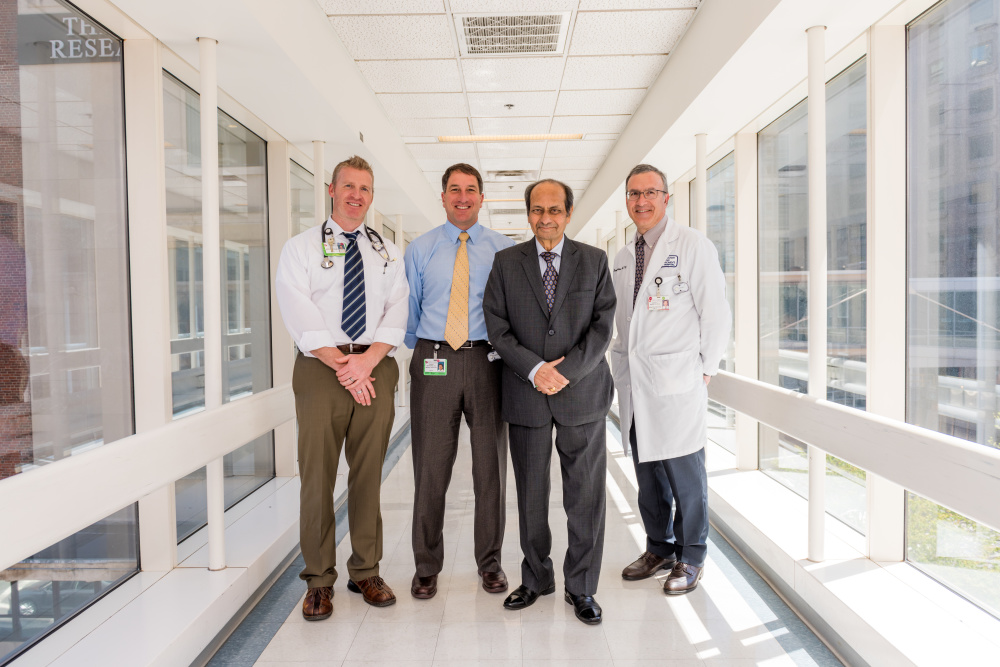
Back when D.N. Chadha, MA, was a pharmaceutical executive meeting with Jeffrey Meyerhardt, MD, MPH, in 2002, he never imagined he’d see the physician years later – this time for rectal cancer treatment.
“The name rang a bell, and as soon as I saw him, I knew,” says Chadha, 74, of his first appointment with Meyerhardt, co-director of the Colon and Rectal Cancer Center at Dana-Farber/Brigham and Women’s Cancer Center (DF/BWCC). “I reminded him we once worked together to launch a drug that helped the side effects of chemo and radiation, and then he remembered, too. We had a good laugh.”
Chadha’s ability to find humor in the chance encounter was characteristic of the positive outlook the Hopkinton, Mass., resident says has helped him through surgery, radiation treatment, and chemotherapy since his December 2015 diagnosis. He admits it wasn’t always easy to stay upbeat, especially during a month of radiation five days a week with Harvey Mamon, MD, PhD, at Brigham and Women’s Hospital, coupled with daily oral chemotherapy and weekly checkups at Dana-Farber with Meyerhardt.
It was the team approach of these two doctors, as well as nurse practitioner Mike Casey, APRN-BC, FNP, and Chadha’s surgeon and Colon and Rectal Cancer Center Co-Director Ronald Bleday, MD, that helped him feel informed – and hopeful.
Learn more:
“Several gastrointestinal cancers, including rectal cancer, often require trimodality care – surgery, chemotherapy, and radiation therapy,” explains Meyerhardt. “The Gastrointestinal Cancer Treatment Center at DF/BWCC has established partnerships with all three modalities to optimize the care of patients like Mr. Chadha, and the Colon and Rectal Cancer Center is formalizing and enhancing multidisciplinary care at an initial consult and throughout treatment. Close communication is important to managing toxicities and coordinating care.”
Chadha credits his wife and two daughters as tremendous sources of support, but says the daily phone conversations he had with Casey and Meyerhardt were vital to stabilizing his situation at home. Personal attention like this helped Chadha overcome early fears and manage side effects, as did his own techniques – such as visualizing New Hampshire’s White Mountains or Cape Cod beaches while in the radiation suite. A published author, Chadha is currently writing a book about his cancer experiences.
“The active communication between specialties, something the patient witnesses firsthand in many cases, often reinforces his or her overall confidence,” says Casey. “Mr. Chadha’s resiliency in the face of very challenging side effects was noteworthy, and the positivity he derived from his care was striking.”
The importance of screening
With his condition stabilized, Chadha is spreading an important message. He never had a colonoscopy until his daughters convinced him to see a doctor at 72 after he had been experiencing rectal bleeding and extreme fatigue. He was lucky his cancer was caught early.
“Colonoscopy is likely the most effective tool we have for screening any type of cancer,” says Mamon. “It can detect cancer at a curable stage, as well as detect and remove pre-malignant polyps, preventing many colorectal cancers from ever forming.”
Colonoscopy is recommended for most individuals starting at 50, and should be started earlier for those with a family history of early onset colorectal cancer, Mamon adds.
